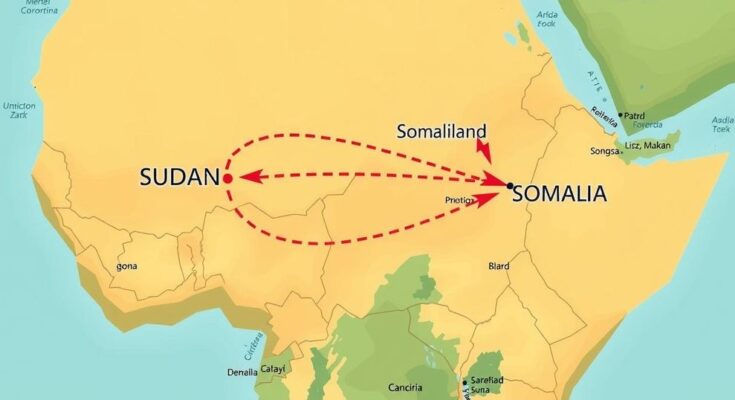The United States and Israel are investigating the relocation of Palestinians from Gaza to Sudan, Somalia, and Somaliland under Trump’s proposed plan. The initiative has met strong resistance, including outright rejections from Sudan and skepticism from Somali officials, raising serious ethical and legal concerns regarding the proposal’s implementation and implications.
The United States and Israel are exploring the possibility of relocating Palestinians from the Gaza Strip to three East African regions: Sudan, Somalia, and Somaliland. This initiative is part of President Donald Trump’s proposed postwar plan. However, the proposal has been met with widespread criticism due to the poor and often violent conditions in these areas. Officials from Sudan have already rejected this overture, while both Somalia and Somaliland report no knowledge of such discussions.
Under Trump’s plan, Gaza’s population of over two million would be permanently resettled elsewhere. This concept was previously a scheme considered by Israel’s ultranationalist faction. Following Trump’s introduction of this idea during a White House meeting, Israeli Prime Minister Benjamin Netanyahu has referred to it as a “bold vision.” Furthermore, there exists strong opposition from the Palestinian community, Arab nations, and human rights organizations, warning that this could constitute a war crime if enforced.
American and Israeli officials have confirmed the outreach to both Somalia and Somaliland. Although Sudan was also contacted, it remains unclear to what extent these discussions advanced. The US and Israel aim to leverage this engagement by offering various incentives like financial aid and security cooperation, a strategy reminiscent of the Abraham Accords negotiated by Trump.
Sudan, which normalized relations with Israel in 2020 following the Abraham Accords, finds itself entrenched in civil war. The violence has led to numerous atrocities, and the International Criminal Court is investigating potential war crimes. Officials from Sudan have disclosed that any proposal concerning relocation was firmly rejected, indicating no further discussion took place regarding the matter.
Somaliland, despite its delicate quest for international recognition, has maintained stability compared to Somalia. The territory’s new president has indicated a desire for recognition, possibly positioning it as a potential partner for the US in exchange for diplomatic support. However, current officials from Somaliland assert that they have not been approached regarding the relocation of Palestinians.
Somalia, known for its fervent support for Palestinian rights, appears to be an unlikely host for Palestinians from Gaza, given its history of solidarity with their plight. A Somali official denied any discussions about receiving refugees, reinforcing the skepticism about the viability of Trump’s proposal. As conditions evolve, the geopolitical climate regarding this sensitive topic remains fluid and unpredictable.
The US and Israel’s initiative to resettle Palestinians from Gaza in East Africa, specifically in Sudan, Somalia, and Somaliland, has faced significant rejection and criticism. Sudan has categorically declined any such proposal, while both Somalia and Somaliland have denied any ongoing discussions. Given the unstable conditions in these regions and robust support for Palestinian rights within Somalia, the feasibility of this plan appears highly questionable. The response from the international community, especially Arab nations, further complicates the situation as alternatives for Palestinian support continue to be explored.
Original Source: www.ndtv.com




